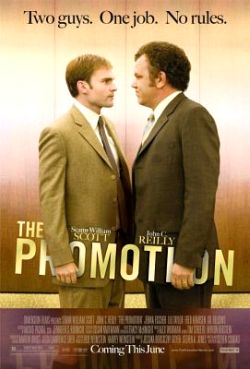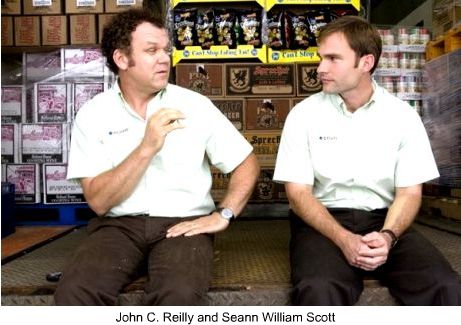
Cinematic attempts to produce comedies about working in retail often end up in over the top disasters such as “Employee of the Month”. Thankfully, I can report that Steve Conrad’s latest effort, “The Promotion”, avoids such a fate. Conrad, who writes and directs the movie, manages to create a subtle yet very funny universal tale about the trials and travails about average men trying to get ahead in the grocery business.
Conrad’s everyman Doug (Seann William Scott) finds himself in his thirties working as an assistant manager in a Donaldson’s Grocery store. Every movement Doug makes reveals a man beaten down by failure wondering what happened to his dreams. Conrad realizes the importance so many working men put on their status or lack there of at work. Therefore, even though Doug has a wonderfully supportive wife (Jenna Fischer), he believes himself to be a failure.
When Doug hears about a new Donaldson’s opening, he becomes energized. He applies to become the store manager believing this will validate him as a man. His spirit soars when it looks like he is a “shoe in”. However, nothing comes easy for the working man. A transplant from a sister chain in Canada, Richard (John C. Reilly), transfers to Doug’s Donaldson store and also applies for the new store manager position.

Here Conrad reveals his skills. Instead of creating a simplistic white hat versus black hat battle, Conrad create a complex battle between two flawed but sympathetic characters who have good hearts but occasionally resort to unethical tactics to get ahead. On the one hand, we have Doug trying to prove himself as a man and trying to provide for his wife. On the other hand, we have the older Richard who sees the potential promotion as his redemption. A former drug addict, Richard uses his ever-present motivational tapes and the support of his wife (Lili Taylor) to overcome his self-destructive tendencies. He believes if he earns this promotion, then he has overcome his past and can be considered a responsible member of society.
Conrad further demonstrates his mastery in how he portrays the battle between the two would-be managers. Lesser writers would make the battle an all out slugfest, but Conrad realizes that real life is much more complicated. Conrad creates a battle where the two are usually very polite and supportive of each other, but occasionally when pushed and when the opportunity presents itself, submarines their competitor. For example, when a frustrated Doug starts throwing spoiled tater tots into a trashcan, one accidentally gets away and hits Richard in the wrist. Richard uses the opportunity to claim the tot injured him. He starts wearing a wrist brace and files a formal complaint. Likewise, when Doug notices a crude poster about an employee displayed, his initial reaction is to take it down. However, Doug realizes that the poster is in the section of the store under the control of Richard, and the board is going to inspect the store that same day. Doug allows the poster to remain, and the board reprimands Richard.

Despite these underhanded tactics, most of the time Doug and Richard are supportive of one another. Indeed, throughout the film Richard provides Doug with moral support always willing to be a sounding board for all of Doug’s concerns. Doug returns the favor. He even refuses to turn Richard in after he catches Richard smoking pot. Even though this would have eliminated Richard for consideration of the manager position. Conrad realizes that this dichotomy reflects the majority of working people. They try their best to be ethical, but when the stakes are high enough and the opportunity presents itself they may be tempted to cross the line.
Though “The Promotion” is full of universal themes about the trials and travails of the working man, it never forgets that it is a comedy. There are many comedic moments that are classic. Such as when a frustrated Doug maces a hooligan, or when Doug and Richard get into a wrestling match while Richard is wearing tap shoes. Perhaps the best moment is when Richard accidentally makes a racial slur at a community center and then tries to talk his way out of it only to make the situation worse.
In a world where comedies often rely on the obvious and the crude, it is such a relief to review a smart comedy that makes some profound universal points. “The Promotion” is truly a high point for Mr. Conrad. Here’s hoping he has many more scripts of this quality in his future.







